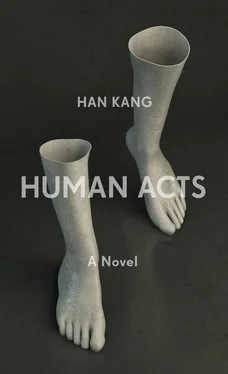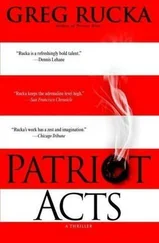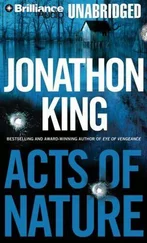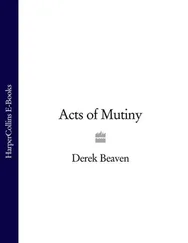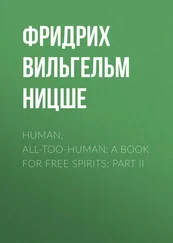Han Kang - Human Acts
Здесь есть возможность читать онлайн «Han Kang - Human Acts» весь текст электронной книги совершенно бесплатно (целиком полную версию без сокращений). В некоторых случаях можно слушать аудио, скачать через торрент в формате fb2 и присутствует краткое содержание. Год выпуска: 2016, Издательство: Portobello Books, Жанр: Современная проза, на английском языке. Описание произведения, (предисловие) а так же отзывы посетителей доступны на портале библиотеки ЛибКат.
- Название:Human Acts
- Автор:
- Издательство:Portobello Books
- Жанр:
- Год:2016
- ISBN:нет данных
- Рейтинг книги:4 / 5. Голосов: 1
-
Избранное:Добавить в избранное
- Отзывы:
-
Ваша оценка:
- 80
- 1
- 2
- 3
- 4
- 5
Human Acts: краткое содержание, описание и аннотация
Предлагаем к чтению аннотацию, описание, краткое содержание или предисловие (зависит от того, что написал сам автор книги «Human Acts»). Если вы не нашли необходимую информацию о книге — напишите в комментариях, мы постараемся отыскать её.
Human Acts
Human Acts — читать онлайн бесплатно полную книгу (весь текст) целиком
Ниже представлен текст книги, разбитый по страницам. Система сохранения места последней прочитанной страницы, позволяет с удобством читать онлайн бесплатно книгу «Human Acts», без необходимости каждый раз заново искать на чём Вы остановились. Поставьте закладку, и сможете в любой момент перейти на страницу, на которой закончили чтение.
Интервал:
Закладка:
This time you didn’t ask for time to think about it.
‘I’m sorry, but I can’t help you.’ Your voice betrayed no emotion.
A few days later, though, Yoon sent a parcel to the office. Inside were the tape recorder and blank tapes that you are looking at now, and a letter. His handwriting was such a scrawl that it was difficult to make out the words, but you struggled through to the end. I understand that you’d prefer not to meet me in person, but might you be able to record your testimony instead and send the tapes to me? His business card was attached to the bottom of the letter with a paper clip.
You reseal the letter to make it look as though it has never been opened, and put it into your locker. The dissertation is still there, from when you filed it away all those years ago; you take it out and peruse it with care, reading through each of the transcripts included in the appendix. Twice. Once your colleagues have all gone out to lunch, the office is quiet. Before they return, you put the dissertation back exactly where you found it and close the locker securely, as though wanting to hide from yourself the fact that you’ve read it.
UP RISING
How strange.
Only the sound of dripping water; yet I remember it as though someone really did come to my door.
That winter night, it seemed as though those imagined footsteps which caused a knot of pain inside me were the stuff of waking reality, while the damp floor and the dripping towel were the substance of a dream.
NOW
You insert the cassette into the Dictaphone.
Your name will be kept anonymous, Yoon had written. Any names of people or places that might enable someone reading to identify you will be assigned a randomly chosen initial. Recording your testimony this way, not only do you get to avoid a face-to-face meeting, but what’s particularly convenient is that you can erase any parts you want to, whenever you like, and re-record them until you’re happy.
Still, you don’t press down on the ‘record’ button. Instead, you run your fingers carefully over the smooth plastic corners of the device, as though checking for a flaw in the design.
By coincidence, voice recordings are precisely what you deal with in this office, every day.
Your job is to transcribe the recordings of informal gatherings and forums, to categorise photographs of certain events, along with reports, trials and testimonies — anything relating to environmental issues — and file them in the record room. For events of particular importance, you produce three or four versions from the original camcorder film, edited depending on what the footage might later be used for. These exercises are time-consuming and monotonous, and not especially distinguished. They are tasks that require you to spend the majority of your time alone. Your workload is, of course, heavier than that of your colleagues, but this isn’t a problem for you; you’re used to working evenings and weekends. Rather than being given a monthly salary, you get paid per job. The amount you’re able to earn this way doesn’t even cover basic living costs, but the financial situation was even worse at the labour organisation.
Over the ten years you’ve been working at your current job, the killings which you spend your days archiving have all been slow and drawn-out. Radioactive elements with long half-lives. Additives that either needed to be banned, or had been banned already but were still being used illegally. Toxic industrial waste, agricultural chemicals and fertilisers which cause leukaemia and other cancers. Engineering practices which destroy the ecosystem.
The tape recordings that Yoon has in his possession will deal with a different world altogether.
You imagine the office of this man whose face you have never seen. You imagine the tapes that will be lined up on his shelves. Each with a name and date, scrawled on its white label in his sloppy handwriting. You imagine the deaths that will be imprinted along the tape’s smooth, brown belt, the living voices that will speak them: a world of guns, bayonets and cudgels; sweat, blood and flesh; wet towels, drill bits and lengths of iron piping. Nothing slow about such deaths.
You put the Dictaphone back down on the desk, bend over and open your locker. You pull Yoon’s dissertation out and turn to the page where the first transcript begins.
They made us keep our heads bowed the whole time, so we had no idea which direction the truck was heading.
We could tell when we were going uphill though, and when the truck eventually stopped and they dragged us out we’d clearly come a fair way out of the city. There was a building, but I couldn’t tell what kind of building it was. Then they started with the ‘disciplinary beatings’ — you know, like they do in the army, only far worse. Kicking us, swearing at us, hitting us with the butts of their rifles. I remember one of us, a plump man in his forties, snapped and started yelling. ‘Just kill me and have done with it!’
That really did it. The soldiers rushed over to him and started wielding their cudgels in earnest. They beat him so viciously it really did look like they weren’t going to stop until they’d killed him. He seemed to go from thrashing around to completely limp in a single moment. Even his feet had stopped twitching. They splashed a bucket of water over his face and took a photograph. The blood was dripping from his face. Blood and water. The rest of us just held our breath.
That wasn’t the only time something like that happened. We spent three days there, in the main hall inside that building. It didn’t seem like an army place, just an ordinary hall like you’d find in any public building. The soldiers mostly went away during the day, just a couple stayed behind to guard us. I assumed they went back into the city centre to crack down on any remaining demonstrators. In the evenings they were drunk by the time they got back to us. Then there’d be another round of disciplinary beatings, and woe betide anyone who did anything other than cower in absolute silence. Anyone who lost consciousness would get kicked into a corner, then the soldier would grab them by the hair and pound their head against the wall. Once they actually stopped breathing, the soldiers would splash water over their face and take a photo, then order them to be stretchered away.
I prayed every night. I don’t mean anything formal; I’d never been a regular at any temple or church. I just asked to be set free from that hell. But they were answered, you see, my prayers were answered. There were around two hundred of us being held captive there, and after three days they released half of us. Including me. At the time we had no idea what was going on, but later on I found out that the army had been about to make a strategic retreat to the suburbs and they thought too many prisoners would just get in the way. They’d chosen who was going to be released purely at random. So it was just blind luck.
We were told to keep our heads down when the truck took us back down the hill, too. But, you know, I was quite young at the time, and I suppose curiosity just got the better of me. I was kneeling right at the very edge of the truck, so if I twisted my neck I could get a look outside through the gap in the sideboards.
I … I’d never dreamed that they’d been keeping us in the university.
The building where we’d been kept was the new lecture hall, just behind the sports ground where me and my friends had used to play football at the weekends. Now, with the army occupying the campus, there were no other signs of human life. The truck itself was rattling along, but otherwise the road was silent as the grave. Then I saw them, lying on a patch of grass by the side of the road. They just looked like they were asleep, at first. Two students in jeans and college sweaters, with a yellow banner laid across their chests as if they’d both been holding up an end. The letters had been done in thick Magic Marker, so I could read it even from inside the truck. END MARTIAL LAW.
Читать дальшеИнтервал:
Закладка:
Похожие книги на «Human Acts»
Представляем Вашему вниманию похожие книги на «Human Acts» списком для выбора. Мы отобрали схожую по названию и смыслу литературу в надежде предоставить читателям больше вариантов отыскать новые, интересные, ещё непрочитанные произведения.
Обсуждение, отзывы о книге «Human Acts» и просто собственные мнения читателей. Оставьте ваши комментарии, напишите, что Вы думаете о произведении, его смысле или главных героях. Укажите что конкретно понравилось, а что нет, и почему Вы так считаете.
